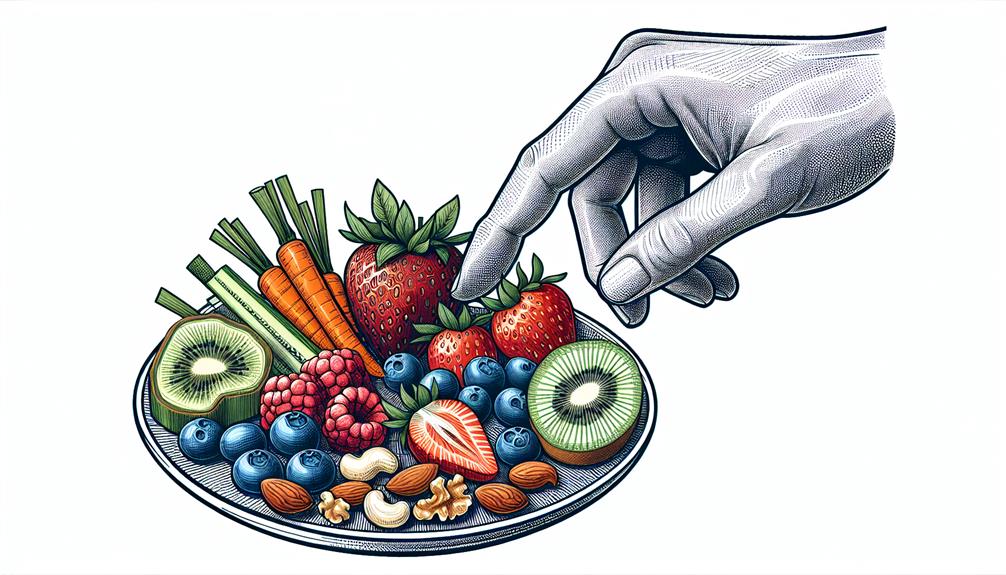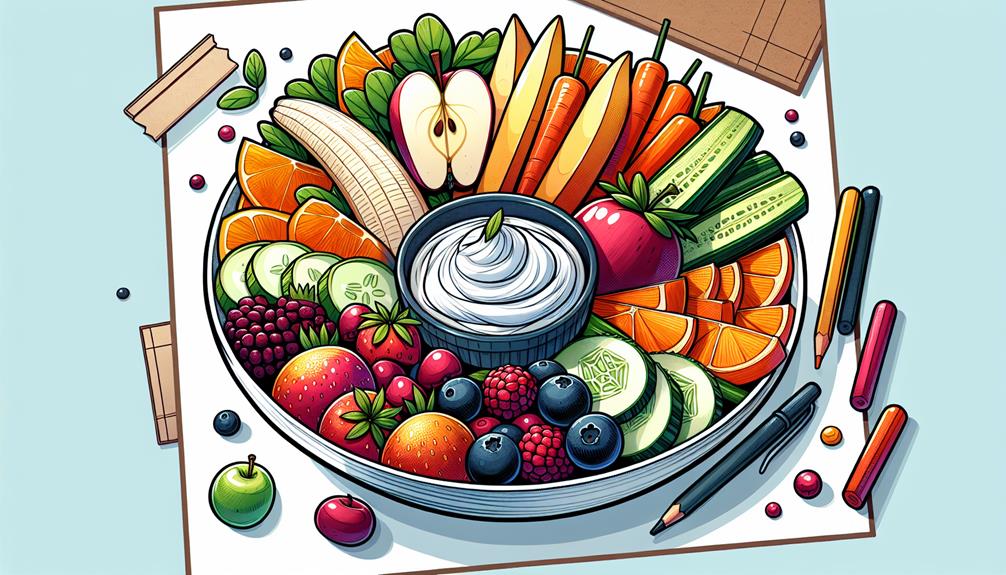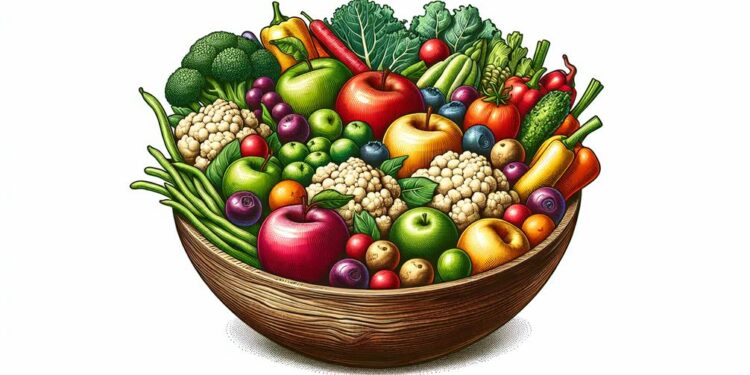Do you ever find yourself reaching for a bag of chips or a candy bar when the afternoon slump hits? Imagine this: you're sitting at your desk, feeling hungry and tired, and you grab a bag of kale chips instead of that tempting bag of potato chips. Not only do you satisfy your hunger, but you also give your body the nutrients it needs to power through the rest of the day. In this discussion, we will explore the world of smart snacking and share some healthy nutrition tips that will keep your munchies satisfied without compromising your health goals. So, are you ready to discover the secrets to guilt-free snacking?
Key Takeaways
- Nutrient-rich snacks, such as whole foods like fruits, vegetables, nuts, and seeds, provide essential vitamins, minerals, fiber, and antioxidants for optimal body function and protection against chronic diseases.
- Choosing the right snack options, such as fresh fruits, Greek yogurt, nuts and seeds, and veggie sticks, ensures a balance of protein, healthy fats, fiber, and essential nutrients.
- Portion control is important for snacking in moderation, and using smaller plates, measuring snacks, opting for single-serving packages, and filling up on fruits and vegetables can help control portion sizes and prevent overeating.
- Making smart swaps, such as choosing air-popped popcorn over potato chips, fresh fruit over sugary cookies, hummus over creamy dips, and roasted nuts over greasy potato chips, allows for guilt-free snacking while nourishing the body.
The Importance of Nutrient-Rich Snacks
Snacking on nutrient-rich foods is crucial for maintaining a healthy diet and providing your body with the essential vitamins and minerals it needs to function optimally. Whole foods snacks, in particular, offer numerous benefits that can contribute to a balanced diet.
Whole foods snacks are those made from unprocessed or minimally processed ingredients, such as fruits, vegetables, nuts, and seeds. These snacks are rich in nutrients, including fiber, antioxidants, and healthy fats. Fiber helps to promote healthy digestion and can aid in weight management by providing a feeling of fullness. Antioxidants protect your body from harmful free radicals, which can lead to chronic diseases like cancer and heart disease. Healthy fats, like those found in nuts and seeds, are important for brain health and can help lower bad cholesterol levels.
Incorporating whole foods snacks into your diet can also help maintain a balanced intake of macronutrients. By choosing snacks that contain a combination of carbohydrates, protein, and healthy fats, you can keep your blood sugar levels stable and prevent energy crashes throughout the day.
To reap the benefits of whole foods snacks, it's important to choose options that are minimally processed and free from added sugars and unhealthy fats. Incorporating a variety of fruits, vegetables, nuts, and seeds into your snacking routine can help support overall health and well-being.
Choosing the Right Snack Options
When choosing snacks, it is important to make mindful decisions that prioritize nutrient-rich options. Snacks can be a great way to satisfy your munchies between meals, but it's essential to choose options that fuel your body with the nutrients it needs. Here are some snack alternatives that are both satisfying and nutritious:
| Snack Option | Benefits |
|---|---|
| Fresh fruits | Packed with vitamins, minerals, and fiber. |
| Greek yogurt | High in protein, calcium, and probiotics. |
| Nuts and seeds | Rich in healthy fats, protein, and antioxidants. |
| Veggie sticks | Low in calories, high in fiber and essential nutrients. |
When snacking on the go, it's crucial to plan ahead and have convenient options readily available. Here are some ideas for snacking on the go:
- Pre-cut vegetables and hummus in a small container.
- Trail mix with a mix of nuts, dried fruits, and whole grain cereal.
- Energy bars made with natural ingredients and no added sugars.
- Single-serve packets of nut butter with whole grain crackers or apple slices.
Remember to read labels and choose snacks that are low in added sugars, sodium, and unhealthy fats. Making mindful choices when it comes to snacking will help you maintain a balanced diet and support your overall health and well-being.
Portion Control: Snacking in Moderation

To practice moderation in your snacking habits, it is important to control your portion sizes. Mindful eating and being aware of how much you consume can help you maintain a balanced diet and prevent overeating. Here are some tips to help you with portion control:
- Use smaller plates and bowls: By using smaller dishes, you trick your brain into thinking you're eating a larger portion. This can help you feel satisfied with less food.
- Measure your snacks: Instead of eating straight from the bag or container, take the time to measure out a portion. This can prevent mindless munching and help you stay within your desired portion size.
- Opt for single-serving packages: Choosing snacks that come in individual packages can help you control your portion sizes. These pre-portioned snacks can be a convenient option when you're on the go.
- Fill up on fruits and vegetables: These nutrient-dense foods are low in calories and high in fiber, making them a great choice for snacking. Aim to fill half of your plate with fruits and vegetables to help control portion sizes and add nutritional value to your snacks.
Smart Swaps for Healthier Snacks
For healthier snacking options, consider making smart swaps that can provide you with nutritious alternatives to traditional snacks. By choosing these nutritious alternatives, you can indulge in guilt-free snacking while still nourishing your body.
Instead of reaching for a bag of potato chips, opt for air-popped popcorn. Popcorn is a whole grain snack that is high in fiber and low in calories. It can be a great source of antioxidants, which help protect your cells from damage.
If you crave something sweet, swap out sugary cookies for fresh fruit. Fruits like berries, apples, and oranges are packed with vitamins, minerals, and fiber. They satisfy your sweet tooth while providing essential nutrients that are beneficial for your overall health.
When it comes to dips, choose hummus instead of creamy ranch or cheese dips. Hummus is made from chickpeas and is a good source of protein and fiber. It is also lower in calories and unhealthy fats compared to traditional dips.
For a crunchy snack, trade in greasy potato chips for roasted nuts. Nuts are rich in healthy fats, protein, and fiber. They can help keep you feeling full and satisfied between meals.
Tips for Mindful Snacking

To make your snacking experience even more beneficial, incorporate mindful snacking techniques that promote awareness and a healthier relationship with food. Mindful eating is about being present in the moment and paying attention to the sensations and emotions that arise while eating. By practicing mindful indulgence, you can enjoy your snacks without guilt or overindulgence. Here are some tips to help you snack mindfully:
- Slow down: Take your time with each bite, savoring the flavors and textures. This allows your brain to register satisfaction, reducing the likelihood of overeating.
- Listen to your body: Pay attention to your hunger and fullness cues. Eat when you're hungry and stop when you're comfortably satisfied.
- Engage your senses: Notice the colors, smells, and tastes of your snacks. This enhances your eating experience and helps you appreciate the food more.
- Minimize distractions: Avoid eating in front of the TV or while scrolling on your phone. Instead, focus solely on your snack, allowing yourself to fully enjoy and appreciate it.
Frequently Asked Questions
What Are Some Examples of Nutrient-Rich Snacks?
Looking for healthy snack ideas? Snacks for weight loss? Try nutrient-rich options like Greek yogurt, almonds, or carrot sticks. These satisfying munchies can help you stay on track with your nutrition goals.
How Can I Choose the Right Snack Options for My Dietary Needs?
To choose the right snack options for your dietary needs, consider healthy snack ideas and snack alternatives. Look for nutrient-rich options that align with your specific dietary requirements and provide sustenance and satisfaction.
Can You Provide Some Portion Control Tips for Snacking in Moderation?
To snack in moderation, try these portion control tips: 1) Use smaller plates or bowls. 2) Pre-portion snacks into individual servings. 3) Listen to your body's hunger and fullness cues. Mindful snacking is key!
What Are Some Smart Swaps I Can Make to Have Healthier Snacks?
To have healthier snacks, you can make smart swaps. Instead of chips, try air-popped popcorn. Swap sugary treats for fresh fruit. Opt for Greek yogurt instead of ice cream. These tips will help you enjoy guilt-free snacking.
Do You Have Any Tips for Practicing Mindful Snacking?
When it comes to practicing mindful snacking, there are a few tips to keep in mind. Mindful eating can help you fully enjoy your snacks and appreciate the benefits of snacking for your overall health.
Conclusion
In conclusion, incorporating nutrient-rich snacks into your diet can have a positive impact on your overall health. By choosing the right snack options and practicing portion control, you can satisfy your munchies while still maintaining a balanced diet. Remember, snacking is like fueling your body with the right nutrients, just as a car needs fuel to keep going. So make smart swaps and practice mindful snacking to keep your body energized and healthy.













